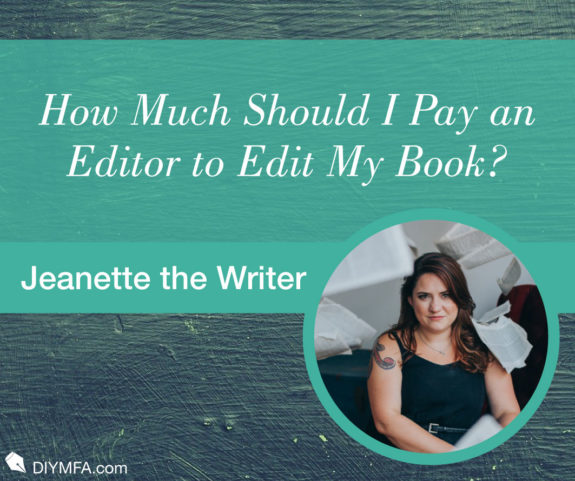I recently saw a post in an editors’ group on Facebook where the original poster was asking for full developmental editing, line editing, formatting, and proofreading of a 40K-word novella. They wanted to publish in less than a month, making this a rush job. And they offered to pay an editor $0.006/word. Multiply that out, and it comes to a measly $240.
While I wanted to lambast this person for thoroughly insulting editors, instead, I politely directed them to a resource where they could learn more about standard industry rates. I then realized it’s something we haven’t covered here at DIY MFA and we should, because industry transparency and setting proper expectations will ensure you get the right service for the right price.
Here are some things to consider when you’re looking to pay an editor to edit your book:
The Type of Editing You’re Asking For
Going back to the Facebook post I mentioned, the OP was asking for every step of editing from the first pass to the final proofread from the same person. Many good editors specialize in just one or two types of editing.
For example, I don’t claim to be a developmental editor. My specialty is making your words sing through line editing or punching up your punctuation with copyediting. Many editors also have a rule about not proofing what they’ve recently line-edited. The OP would likely be better off from a services standpoint consulting with multiple specialists.
As for how this affects what you pay an editor, just realize that paying one person to do two things may mean two separate prices for each service. A line edit may go for one price while a proofread is negotiated separately. Developmental editing often costs the most. Could you get a bundle deal for some of these services? That’s up to the editor, but I personally charge separately for each project.
How Much Editing Is Required?
Writers seek out editors at many different stages of the writing process and some writers may be better at certain aspects than others, which means their editing could take more or less time. If your editor is charging hourly, having a cleaner manuscript will mean faster work, taking down the price.
Good editors will also evaluate a sample of your work to make sure the editing you want is the editing you need and to estimate how much time or effort it may take. Depending on what we see, the rate for editing can change.
How Long Editing Actually Takes
In the Facebook post, the OP wanted to publish the manuscript in less than a month. This seemed fairly unrealistic to me considering everything they were asking for. Good editors are in high demand and are often booked months in advance. We carefully lay out our schedules to make sure we can get the work done properly without rushing through and missing things. Many of us juggle multiple projects at the same time.
How does this affect your wallet? Well, if a client asks me to put their project ahead of others to meet a strict deadline, there’s a surcharge for that. Depending on how busy I am or how much of a rush it is, I’ve charged up to 40% more than what a non-rush quote would be. That number could be much higher with other editors.
So, How Much Should I Pay an Editor?
Now, let’s talk about pricing. Truly, the number offered in the original post was laughable. Is there an editor out there who would pick up that job? I would sincerely hope not, but yeah, people do. I would, however, question this person’s reasoning in agreeing to complete the project for so little money.
As for rates, I’m partial to the EFA’s (Editorial Freelancer Association) median rates. Keep in mind, these aren’t bottom and top prices. This is the industry median (between the middle values in a data set) based on real reported rates from working editors. Will you find lower? Yes. Will you find much higher? Absolutely.
This means there is a wide range in what you might pay for editing, keeping in mind the type of editing, cleanliness of the manuscript, and the timeline.
Part of deciding what to pay for editing is deciding on the caliber of editor you want. Are there amazing editors with lower rates? I’d say yes. Could you overpay for someone’s shoddy job? Yeah, that could happen too.
Luckily, there are plenty of articles about how to evaluate an editor before you work with them. (Hint: a lot of it is about personality matching.) It’s a balancing act between the right fit and what you can afford.
Speaking of which, having a budget in mind to start out with can help you not overpay for services. Or at least you’ll end up feeling good about how much you spent.
What should you budget? Let’s do some simple math. Developmental editing sits at a median rate of $0.03 to $0.039 per word. And let’s say you have a 50K-word novel. Multiplication tells us that your pricing could be around $1500 to $2000.
It could also be charged hourly (median EFA pricing is $46-50/hour); in which case the final price depends on how fast the editor works based on the number of pages. An industry-standard page is 250 words, meaning your 50K-word manuscript is about 200 pages. The EFA reports that editors work at a median pace of 4-6 pages per hour, equaling between 30 and 50 hours of editing. Again, multiplication says this will be around $1300 to $2500 for your developmental edit.
You can use the same math to estimate your price for other types of editing based on this chart.
In the end, there is too wide a variety of pricing to spell out in this article. But I recommend budgeting $1000+ for a good editor going through one stage of editing.
If you’re self-publishing, you may need several rounds of editing with one or more editors. You also might need other people on your team like a graphic designer for your cover or a formatting expert for your layout.
Overall, editors strongly encourage each other to charge within industry standards. We consult with each other on pricing and even pass off jobs to each other if we know our rates aren’t inside the writer’s budget. When it comes to editing, don’t let sticker shock deter you from seeking out help. Slowly put aside your funds for editing. In the meantime, head to your local writing or critique group and learn from fellow writers who may be at a more advanced stage than yourself. Try grammar software (but please don’t blindly accept every change!). Pull the trigger when you’re ready for a professional to step in.

Jeanette the Writer is a freelance editor and writer based in Dallas, TX. When not at the computer, you can find her crafting, scuba diving, or posting pictures of her cats on Instagram. Visit JeanettetheWriter.com for more info and follow @JeanettetheWriter on Instagram and Facebook or @JeanettetheWrtr on Twitter.







